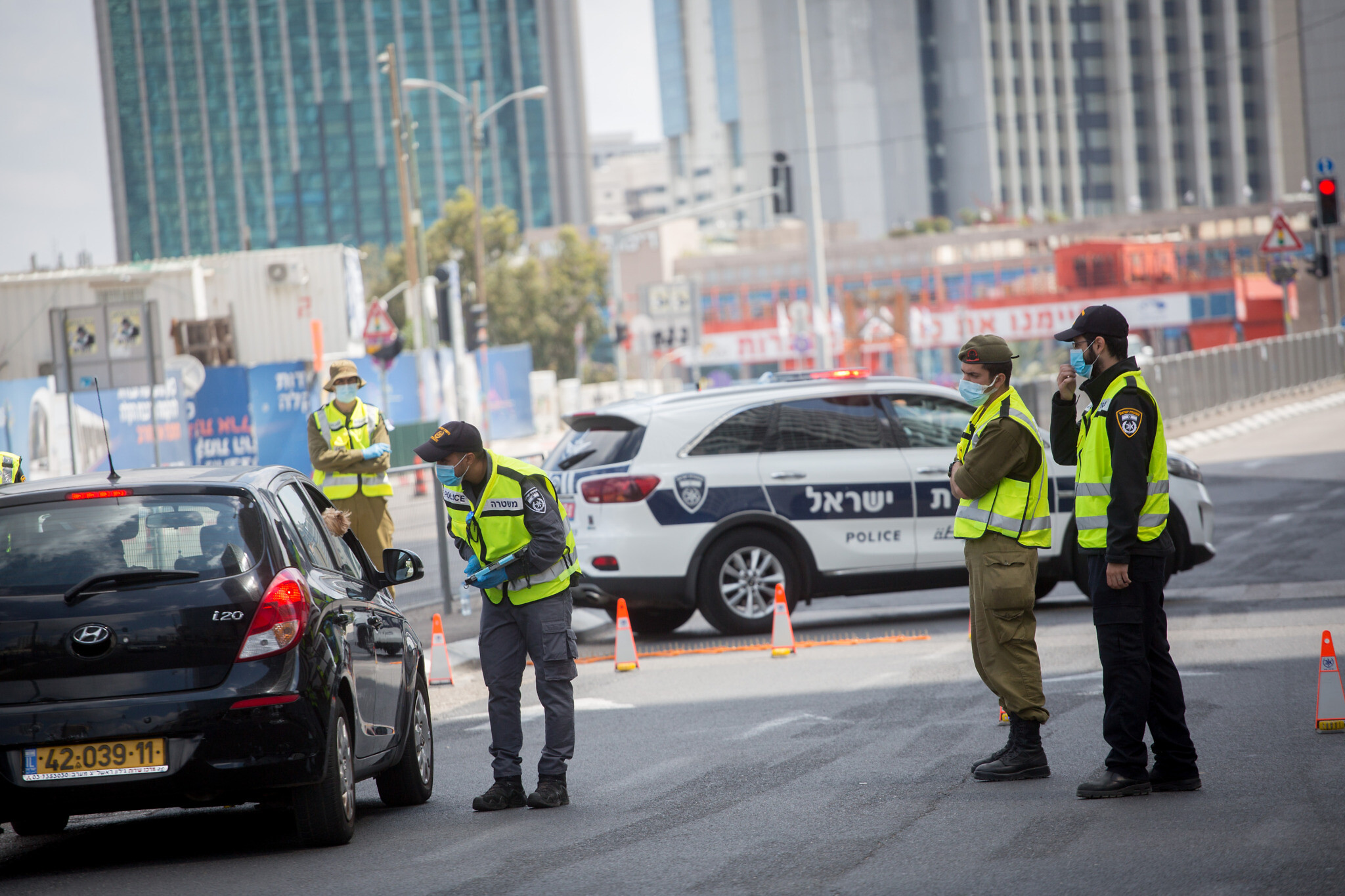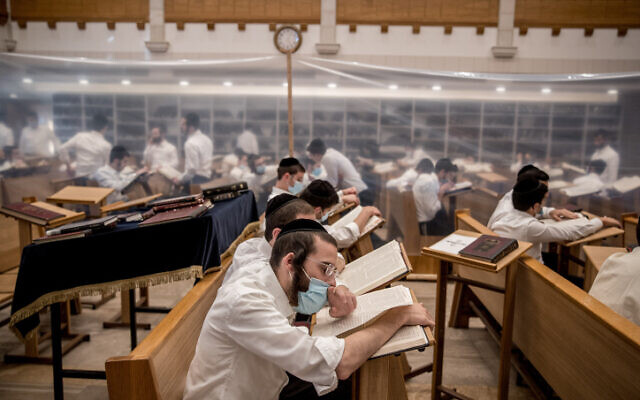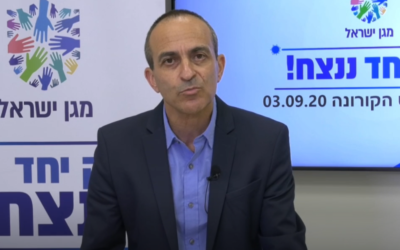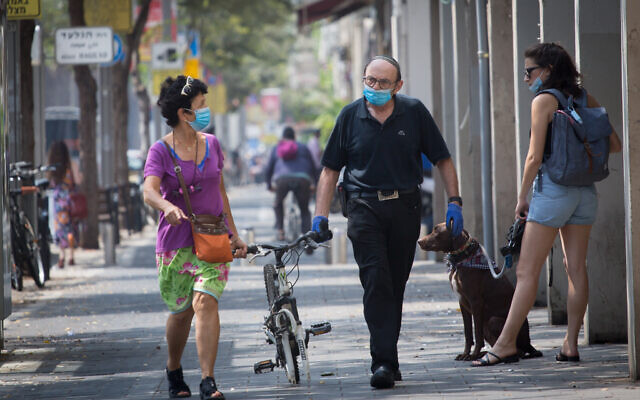
Rules expected to include ban on entering and leaving town,
keeping residents within 500 meters of home, closing down
public transportation, schools and non-essential businesses.
Cabinet ministers voted Thursday to impose lockdowns over 30 “red” cities that have high coronavirus infection rates, a day after Israel’s infection numbers reached a new record of over 3,000 daily cases.
Members of the so-called coronavirus cabinet, a limited forum of ministers, decided that lockdowns would take effect on Monday, according to widespread Hebrew media reports.
The restrictions under discussion for the 30 municipalities included banning entry and exit, keeping residents within 500 meters of their homes, stopping public transportation, and closing non-essential businesses and all schools save for daycare facilities and special education programs.
Addressing the country’s spiraling situation in a press conference shortly after the cabinet meting, the government’s coronavirus czar Prof. Ronni Gamzu, visibly distraught, implored the public to start treating the situation seriously.
“This is a message to all of Israel: No weddings! No mass gatherings! No dismissal [of guidelines] at any restaurant or anywhere!” he said, his voice rising. “I’m sorry to be emotional. This is a pivotal moment… All of Israel is at war. Illness numbers that climb from 2,000 to 3,000 in one day should worry us all.
“Anyone who doesn’t put an a mask and who disregards [instructions] is spitting in the face of doctors and nurses who are working 24 hours a day at coronavirus wards,” Gamzu added.
Prime Minister Benjamin Netanyahu released a video statement confirming the coronavirus cabinet decision. He said that though over the past month, Israel’s morbidity rate has been “very high,” it had remained relatively stable. But “in recent days a rise began and [there was] a very dramatic rise yesterday.”
He urged Israelis to work with authorities “to block this sickness.”
The closures were to be dependent on police’s ability to devote enough manpower to enforcement in all 30 cities — otherwise the number of locked down cities could be brought down. Defense Minister Benny Gantz on Thursday instructed the military to prepare to send thousands of soldiers to aid police.
Though there is no official word yet on which cities will be locked down, the 30 cities and towns currently designated as “red” are: Nazareth, Bnei Brak, Tiberias, Abu Snan, Umm al-Fahm, Elad, Aabalin, Buqata, Beit Jann, Jaljulya, Jatt, Daliyat al-Karmel, Zemer, Taibe, Tira, Kasra-Samia, Ka’abiyye-Tabbash-Hajajre, Kafr Bara, Kafr Kanna, Kafr Qassem, Lakiya, Sheikh Danun, Maale Iron, Ein Mahil, Assafiya, Arara, Fureidis, Qalansawe, Rechasim, and Kfar Aza.
Many of the towns are predominantly ultra-Orthodox and Arab, two segments of the population that have been hit hard by the virus.

While a nationwide lockdown during the High Holiday period beginning September 18 was supposed to be discussed during Thursday’s meeting of the coronavirus cabinet, according to reports, a decision is only expected to be made in a week or so.
Gamzu emphasized the infection rates in the Arab and ultra-Orthodox communities as those that most concerned him, noting “a lack of internalization” by some of the seriousness of the situation.
He urged the public “to stand behind the government and the cabinet as one, because there are more difficult decisions ahead. We will need to… see how things go in the next few days.”
Channel 12 reported that some 5,000 people attended a wedding on Wednesday night in the northern Arab town of Shfaram.
But illegal weddings have been held by other groups as well. Haaretz reported earlier this week that hundreds attended the illicit wedding of the son of Israel’s Ambassador to China Zvi Hefetz.

briefing on September 3, 2020.
(Screen capture/Health Ministry livestream)
Gamzu warned that while the Arab and Haredi communities were at the “forefront” of the “war,” cases were trickling into all towns and none were immune.
Health Ministry figures released Thursday showed that the national death toll since the start of the pandemic has been highest in the country’s capital: 149 of the 976 fatalities were Jerusalem residents. It was followed by the ultra-Orthodox town of Bnei Brak, where 89 have died; Tel Aviv, where 64 have died; and Bat Yam, where 42 fatalities have been counted.
Just over 60 percent of the deaths, 601, have been individuals between the ages of 70 and 90-years-old, while 194 were patients between the ages of 90 and 102-years-old. Coronavirus fatalities between ages 50-70 have accounted for 150 of the total deaths, while 20 people between ages 30-50 have passed away from the virus. Only five have died between ages 5-19.
At the same time, a separate report from the Central Bureau of Statistics revealed that despite the deaths resulting from the pandemic, there has been no spike in Israel’s overall death rate between January and July of this year, compared to the same period in the previous five years.
The Health Ministry reported over 3,000 new daily cases on Wednesday, a record high, apparently contributing to the drastic measure decided upon by ministers.
According to the Ynet new site, ultra-Orthodox ministers Aryeh Deri, head of the Shas party, and Yaakov Litzman, who leads United Torah Judaism, both opposed the local closures, claiming this was a Band-Aid approach rather than a true solution.
Also during Thursday’s coronavirus cabinet meeting, ministers were presented with research predicting hospitals could be overwhelmed within two weeks as the number of virus cases creeps upward.
The study by researchers at Hebrew University of Jerusalem predicted the country would have 600 serious COVID-19 cases in mid-September, up from 426 on Wednesday, setting up hospitals to face their worst-case scenarios of exhausted resources.
The study noted that the government’s health policies this summer had failed to reduce the number of daily cases.

Hospital chiefs on Thursday also sounded the alarm on a potential overload, while warning that care for patients with ailments other than COVID-19 could be compromised.
The spike in cases came just two days after 2.4 million Israeli children went back to school, and just two weeks before the High Holidays begin.
Both schools and synagogues were pinpointed as vectors of the deadly virus in the first months of the pandemic.
(Times of Israel).